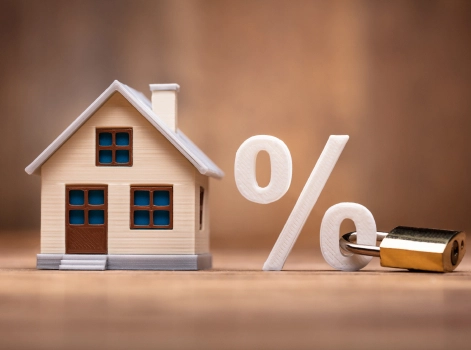Updated: 25 Jul, 2024
The housing market in Australia is constantly evolving, with prices and demand fluctuating over time. Currently, there are concerns about the slowdown in the market, with prices falling in most areas. For many potential homebuyers, this uncertainty can make the idea of buying a house seem daunting. However, despite the risks that come with buying a house when prices are falling, there are also significant opportunities and benefits that can make it a smart move for the right buyer. In this blog, we will explore the pros and cons of buying a house in a falling market.
Advantages Of Buying A House When Prices Are Falling
1. Lower Purchase Price
The most obvious advantage of buying a house when prices are falling is a lower purchase price. When the price tag is getting smaller, the total cost of buying a home is likely to be lower than it would be during a period of rising prices. This can be a significant advantage for buyers who are looking to stretch their budget and get more value for their money. For example, if a house was listed for sale a year ago at $500,000, but is now being sold for $450,000, a buyer could save a significant amount of money in addition to the $50,000 reduction in the house’s price. This is because the buyer would also pay much less in stamp duty fees, as well as less in total interest and repayments over the life of the loan, assuming all other factors including interest rate were equal. Buying the house now could save the buyer a lot of money in the long run, compared with if they had bought it a year ago. This also makes it easier for the buyer to afford a home that might have been out of reach during a period of rising prices.
2. Low Competition
A decline in the property market can be a good opportunity for people to enter the housing market, as there is less competition among buyers. This, along with low rental vacancies and high rent, may encourage first-home buyers to enter the market in 2023. Reports show a drop in demand from first-home buyers in the property market, which means there is less competition to buy homes at the moment. So, it can present opportunities for potential buyers with a large deposit to overcome their fear and take advantage of the slower market. First-home buyers who still have high incomes and stable jobs are in the best position to take advantage of the opportunities in the market in 2023; however, others may still be able to buy their first home if they are willing to settle for a less valuable property that they can afford despite having less borrowing power.
3. More Bargaining Power With The Seller
There may be fewer buyers and more properties available in a downturn, which can give buyers more leverage when negotiating with sellers, who may be more motivated to sell and, therefore, willing to make more compromises to close the deal. This potentially allows the buyer to get a lower price or more favourable terms.
4. Potential For Long-Term Gains
Purchasing a home during the slower part of the property cycle can increase the return on your investment over the long term. The market will eventually bottom out and start to recover, which could result in significant gains for homeowners who bought during the period of falling prices. For example, if a buyer purchases a home for $550,000 when prices are declining and the market eventually recovers, the value of their home may increase to $600,000 or more. Although there has been a downturn in the value of housing recently, it’s not a big concern if we are focused on long-term gains. CoreLogic records show that over the long term, housing values have consistently trended upwards. In the decade from 2012 to 2022, the national Home Value Index increased by 72%, which is higher than the 59% increase seen in the previous decade. This suggests that investing in property for the long term can be a good strategy for building wealth. Remember, however, gains are never a certainty. There is no guarantee that buying a house in a falling market will result in long-term gains. But you can improve your chances by carefully researching the market and the neighbourhood. For example, if a neighbourhood experiences significant growth and attracts new businesses, the value of homes in the area is more likely to increase over time.
5. A Chance To Benefit From The Falling Market And The Rising Market
The auction clearance rate is a great indicator of the market situation. As a rough guide:
- More than 80%: It’s a seller’s market with prices rising rapidly.
- 50%-65%: The market is in equilibrium.
- Less than 50%: It’s a buyer’s market with prices falling.
A change in auction clearance rates, in either direction, lets us know the market is shifting. For example, the auction clearance rates across the combined state capitals rose from 56.4% in the last week of November to 61.9% in the first week of February. This suggests that the market is fairly balanced. The steady rise of the auction clearance rate may be a sign that the clearance rate has stopped falling and is shifting slowly from a buyer’s market to a seller’s market. Home Loan Experts founder Otto Dargan says when clearance rates stop falling, that can be a sign it is the best time for some to buy. It is a good sign that the market has reached the bottom. The housing market may be stabilising and this could be a good opportunity for potential buyers to grab the benefit of both the falling market and recovering market, if it starts to recover.
Risks And Challenges
While there may be opportunities to purchase properties at lower prices, there are also potential concerns, such as the possibility of prices falling further and leaving the buyer with negative equity – owing more on the mortgage than the property is worth. Here are some other concerns to consider before buying a home in a declining market.
1. Concerns About Market Uncertainty
When the market is declining, it can be difficult to predict whether prices will continue to fall or when recovery may occur. Interest rates may continue to rise and there is the possibility of property prices falling further. Borrowers may end up making monthly repayments at higher interest rates for a property whose value is depreciating. These possibilities can create uncertainty for buyers, leading to hesitation before making a purchase. If the value of their property keeps decreasing, the equity in their house will fall and may even result in negative equity. In this case, they may struggle to sell the property or refinance their mortgage, leaving them in a mortgage trap. It’s important to carefully consider the concerns about market uncertainty when buying a house in a falling market. Our brokers can help you make an informed decision and minimise your risk. Call us on 1300 889 743 or fill in our free online assessment form today.
2. Limits On Your Borrowing Power
High interest rates reduce your borrowing power because your monthly repayment increases and, at some point, the bank will say that it’s too much for you to afford, especially since lenders add 3 percentage points to the interest rate you’re getting when assessing your borrowing power. For example, if you are borrowing at 4.5%, the bank will assess your ability to service the loan based on your ability to make the monthly repayments if the rate increases to 7.5%. If the lender determines that you would not be able to make such payments, you will not be approved for the loan. In this case, you should either reduce the loan amount you’re requesting or look for a cheaper property.
How To Prepare For Buying A House In A Falling Market
- Research the market and neighbourhoods
- Get a pre-approval from the lender
- Consider the long-term benefit
- Consider how the market is shifting
- Work with a mortgage broker, as they have access to a wide range of lenders and can negotiate with them for better terms
We Are Here To Help!
Home Loan Experts’ specialist mortgage brokers have the expertise to help you navigate the complexities of a falling property market to find the best options for your budget and goals. Our experts can help you make an informed decision. Call us on 1300 889 743 or enquire online for free.









